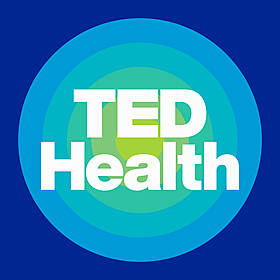
Blindness isn't a tragic binary — it's a rich spectrum | Andrew Leland
8 October 2024 - 7 minsWhen does vision loss become blindness? This week we're revisiting a talk by writer, audio producer and editor Andrew Leland as he explains how his gradual loss of vision revealed a paradoxical truth about blindness — and shows why it might have implications for how all of us see the world.
Hosted on Acast. See acast.com/privacy for more information.

The science of raising kids (Part 2): How to raise healthy kids with Dr. Shari Barkin
From negotiating food choices to limiting screen time, raising healthy kids is complicated—but it doesn’t have to be, says pediatrician Dr. Shari Barkin. Dr. Barkin joins Shoshana to talk about the ways caregivers can carve out 10 minutes of their day to model a healthy lifestyle and help everyone in the family thrive. Talk featured: Inside the mind of a newborn baby - Claudia Passos Ferreira Learn more about our flagship conference happening this April at attend.ted.com/podcast Hosted on Acast. See acast.com/privacy for more information.
40 mins
17 February Finished

The science of raising kids (Part 1): Are you raising anxious kids? with Lenore Skenazy and Mathilde H. Ross
Whether it’s micromanaging playtime, constantly hovering or incessantly texting, the adult takeover of childhood has created a crisis of anxiety in both children and parents. In this episode, Lenore Skenazy, cofounder and president Let Grow, an organization dedicated to normalizing childhood independence, lays out the unexpected benefits of letting our kids be a bit more “free range.” Then psychologist Mathilde H Ross makes the case on why parents should trust their instinct instead of chasing trends. Talks Featured Why you should spend less time with your kids - Lenore Skenazy Is parenting advice leading to more anxious kids? - Mathilde H. Ross Learn more about our flagship conference happening this April at attend.ted.com/podcast Hosted on Acast. See acast.com/privacy for more information.
26 mins
10 February Finished

Interview: Matthew Facciani on fighting healthcare misinformation
Bombarded with health headlines? Unsure how to discern fact from fiction? Social scientist Matthew Facciani breaks down identity politics and the psychology that shapes our most deeply held views. He discusses how healthcare professionals can do better at communicating public health policy to everyday people and why following someone whose viewpoint you disagree with can help you reflect on your biases. Talk Featured 3 questions to ask before buying into health trends - Dr. Karen Dawe Learn more about our flagship conference happening this April at attend.ted.com/podcast Hosted on Acast. See acast.com/privacy for more information.
40 mins
3 February Finished

Why building new proteins from scratch is our new superpower | David Baker
The rapidly evolving field of protein design is revealing solutions to some of the world’s greatest problems, whether it's blocking a virus, breaking down a pollutant or creating brand-new materials. In conversation with TED’s Whitney Pennington Rodgers, biochemist David Baker explores his team’s Nobel Prize-winning work using AI to design new proteins with functions never before seen in nature — achieving breakthroughs that have fundamentally changed the future of science. (This conversation was part of an exclusive TED Membership event. TED Membership is the best way to support and engage with the big ideas you love from TED. To learn more, visit ted.com/membership.) Learn more about our flagship conference happening this April at attend.ted.com/podcast Hosted on Acast. See acast.com/privacy for more information.
29 mins
27 January Finished

How AI is saving billions of years of human research time | Max Jaderberg
Can AI compress the years long research time of a PhD into seconds? Research scientist Max Jaderberg explores how “AI analogs” simulate real-world lab work with staggering speed and scale, unlocking new insights on protein folding and drug discovery. Drawing on his experience working on Isomorphic Labs' and Google DeepMind's AlphaFold 3 — an AI model for predicting the structure of molecules — Jaderberg explains how this new technology frees up researchers' time and resources to better understand the real, messy world and tackle the next frontiers of science, medicine and more. Learn more about our flagship conference happening this April at attend.ted.com/podcast Hosted on Acast. See acast.com/privacy for more information.
19 mins
20 January Finished

Interview: What happens to your brain without any social contact? with Dr. Vivek Murthy
In this episode, Shoshana invites Dr. Vivek Murthy, the 19th and 21st Surgeon General of the United States, to discuss the ongoing loneliness epidemic. After the interview, Shoshana shares a TED-Ed talk from Terry Kupers, "What happens to your brain without social contact?" Everyone needs time to themselves, and peaceful solitude has stress-relieving benefits. But when being alone is forced upon you, the effects can be surprisingly extensive. And though different people experience distinct effects, symptoms tend to become more severe and persistent the longer they're isolated. So, how exactly does isolation affect your body and brain? Terry Kupers investigates. [Directed by Camille Bovey, narrated by Addison Anderson, music by Stephen LaRosa]. Learn more about our flagship conference happening this April at attend.ted.com/podcast Hosted on Acast. See acast.com/privacy for more information.
37 mins
13 January Finished





















